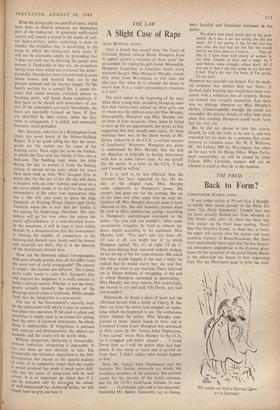7 HE LAW
A Slight Case of Rape
ALAN WATKINS writes:
Over a month has passed since the Court of Criminal Appeal refused Derek Hampton leave to appeal against a sentence of three years' im- prisonment for raping his girl-friend. Meanwhile, Hampton languishes in Lancaster Gaol; every weekend the girl, Miss Margaret Murphy, travels fifty miles from Warrington to visit him; she also says that when he is released she wants to marry him. It is a rather extraordinary situation, is it not?
The story opens at the beginning of the year, when three young men, including Hampton (who was then twenty-two), picked up three girls,-one of whom was the eighteen-year-old Miss Murphy. Subsequently, Hampton and Miss Murphy met on three or four occasions. Once, when he failed to turn up for an appointment, she wrote to him suggesting that they should meet again. At these meetings there was, in the chaste words of Mr. Justice Ashworth in the CCA, `a certain amount of familiarity.' Moreover, Hampton was given to understand by Miss Murphy that she had no objection in principle to having intercourse with him at some future time. As she herself put the matter in a letter to the CCA, 'I had said I would be willing.'
It is as well to be less elliptical than the accounts that have appeared so far. On the day of the alleged rape, Miss Murphy came voluntarily to Hampton's house. His parents had gone out, for the evening. She sat on his knee and after some time he took her knickers off. Miss Murphy does not seem to have objected to this. She did, however, protest when he tried to effect penetration, saying—according to Hampton's unchallenged statement to the• police—'no, you said you wouldn't.' After some inconclusive struggles, he tried to remove her dress. Again according to his statement, Miss Murphy said: 'You don't take my dress off, I'll take it off, you might tear it,' to which Hampton replied, 'No, it's all right, I'll do it.' The dress having been removed without mishap, he lay on top of her for some minutes. She asked him what would happen if she had a baby; he replied that he would marry her; she said that she did not want to get married. There followed ten or fifteen minutes of struggling, at the end of which Hampton succeeded in penetrating— Miss Murphy was virgo intacta. Not surprisingly, she started to cry and said, 'Oh Derek, you said you wouldn't.'
Afterwards, he drank a glass of stout and she refreshed herself with a bottle of Cherry B. She then ran from the house and ,stopped an ambu- lance which she happened to see. The ambulance driver fetched the police; Miss Murphy com- plained to them; wheels began to turn; and at Liverpool Crown Court Hampton was sentenced to three years by Mr. Justice John Stephenson. 'I was scared,' wrote Miss Murphy to the CCA, `so I struggled and didn't consent . . . I hated Derek then so I told the police what had hap- pened. It was taken to court and it carried on from there. I didn't realise what would happen to him.'
' Both Mr. Justice John Stephenson and the bachelor Mr. Justice Ashworth are hardly the worldliest members of the judiciary. But another reason for the severity of the initial sentence, and for the CCA's hard-faced attitude ('a sen- tence . . . in principle right and in fact deserved,' thundered Mr. Justice Ashworth), lay in Hamp;
ton's boastful and insensitive statement to the police.
She didn't hurt much [went part of the state-
ment). As I say, I am not saying she did not resist. All I am saying is she let me feel her and after she had had her fun like she would not let me have mine so I took it. . . . They all like it. I have been with plenty of women in my time. Usually at least one a week. As I said before, some struggle, others don't. All I can say is that I am just going to act the way I feel. That's the way I'm born. If I'm guilty, it's my fault.
Hampton was possibly too honest. For the medi- cal evidence was neither here nor there: it showed slight bruising that would have been con- sistent with a voluntary loss of virginity. Hamp- ton himself was virtually unmarked. And there was no damage whatever to Miss Murphy's clothes. Understandably enough, she could not remember the precise details of what had taken place that evening. Hampton could easily haye lied his way out.
But he did not choose to take this course. Instead, he told the truth as he saw it, and was rewarded for his pains by a sentence that seems contrary to common sense. Mr. W. T. Williams, QC, the tabour MP for Warrington, has taken up the case with the Home Office. When Parlia- ment reassembles, he will be joined by other Labour MPs, Certainly, matters will not be allowed to stand as they do at the moment.






























 Previous page
Previous page